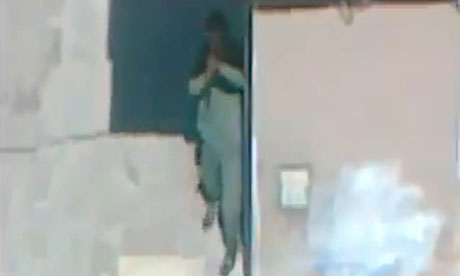By Jonathan Jones


Video footage has emerged from Homs, Syria in which a man filming gunfire in the streets appears to be shot dead by a sniper. Photograph: YouTube
The angel of death has been caught on camera. That is what a gunman randomly shooting from a dark doorway looks like in raw and terrifying video footage that has surfaced this week on YouTube. Wearing military-looking khaki and firing quite randomly at people in a Syrian city, "without any reason and no demonstrations", the figure embodies the stories of ruthless state violence emerging from a country where conventional reporting is all but impossible.
You look at death, and death looks at you. The cameraman – apparently using a mobile phone to grab these images in the heat of the moment – nervously and jerkily photographs a vertiginous collage of building facades, balconies and a fleeing crowd on the street below before homing in on the sinister military figure who is shooting from a doorway on a balcony just below his elevated viewpoint. But no sooner does the camera see the assassin than the assassin sees the photographer: and shoots. The last part of the video is a brown abstract mist as we hear moans against continuing shots and yells.
Life here seems to have created its own grisly remake of Alfred Hitchcock's Rear Window. The analogies are eerily close. Hitchcock's classic film is set in an enclosed urban space, with tall buildings facing one another over a courtyard. As an injured war photographer recuperates in his apartment he becomes a voyeur out of boredom and witnesses a murder: he has to use the flash of his camera as a defence when the murderer comes to get him. James Stewart survives, but this photographer appears to have died. And instead of the painted wooden architecture of a Hitchcock film set, the power of this sequence of images lies in the rapid jagged evocation of a very real city: the messy jumble of balconies and stained walls, the glimpses of blue sky and the road below, the surfaces of concrete and asphalt, take us into the textures and experience of urban Syria. And then that doorway materialises, dark and bleak, and the shooter appears.
Yet all its echoes of fictional cinema raise a question. Is this film entirely reliable and authentic? It was posted on YouTube earlier in the week but soon some viewers started to raise doubts, as was reported by Global Voices. The way that I have described the video perhaps fuels suspicion. For can it really be chance that has replicated the classic topos of the endangered voyeur perfectly so framed by Hitchcock? With tight press controls in place in Syria, and the consequent impossibility of checking facts, scepticism is inevitable. It is natural to be cautious after the widely followed blog A Gay Girl in Damascus was exposed as a hoax. So, let's begin with a tough question: is this film a fake?
We should start not with art criticism, but history. Contemporary events in Syria conform to patterns of violence that go back to the 1980s. This week protesters, or people the army classed as protesters, have been killed in Hama, as resistance to the regime of Bashar al-Assad refuses to fade away. The focus on Hama chills those who can remember the events of 1982. It was the city where the Assad family chose to obliterate a rebellion by the Muslim Brotherhood. After violence by both sides failed to settle an Islamist rising, Rifaat al-Assad led a military onslaught on Hama that culminated in a systematic campaign of cold-blooded executions in which at least 10,000 people died.
Just to describe that calculated use of extreme violence is to see how the images in this film do indeed fit the facts of Syrian government violence. The gunman hidden in a doorway is the kind of calculated random attack by which this regime has traditionally outfought threats. It is a government with an appetite for violence and a policy of overreaction that has until now been highly effective. The more you look at the known facts the more this footage feels true.
Its soundtrack – even for anglophone listeners – surely clinches the authenticity. Moans and cries, shots and sounds of panic are too real to be faked. The blank screen as the cameraman lies dying is another rawly real aspect of the footage. To doubt this film's reliability is, in the end, to doubt too much. It is a visceral insight into what is happening right now in Syria, a glimpse of a truth more calamitous than fiction.
-This commentary was published in The Guardian on 08/07/2011
- Jonathan Jones writes on art for the Guardian and was on the jury for the 2009 Turner prize
- Jonathan Jones writes on art for the Guardian and was on the jury for the 2009 Turner prize



